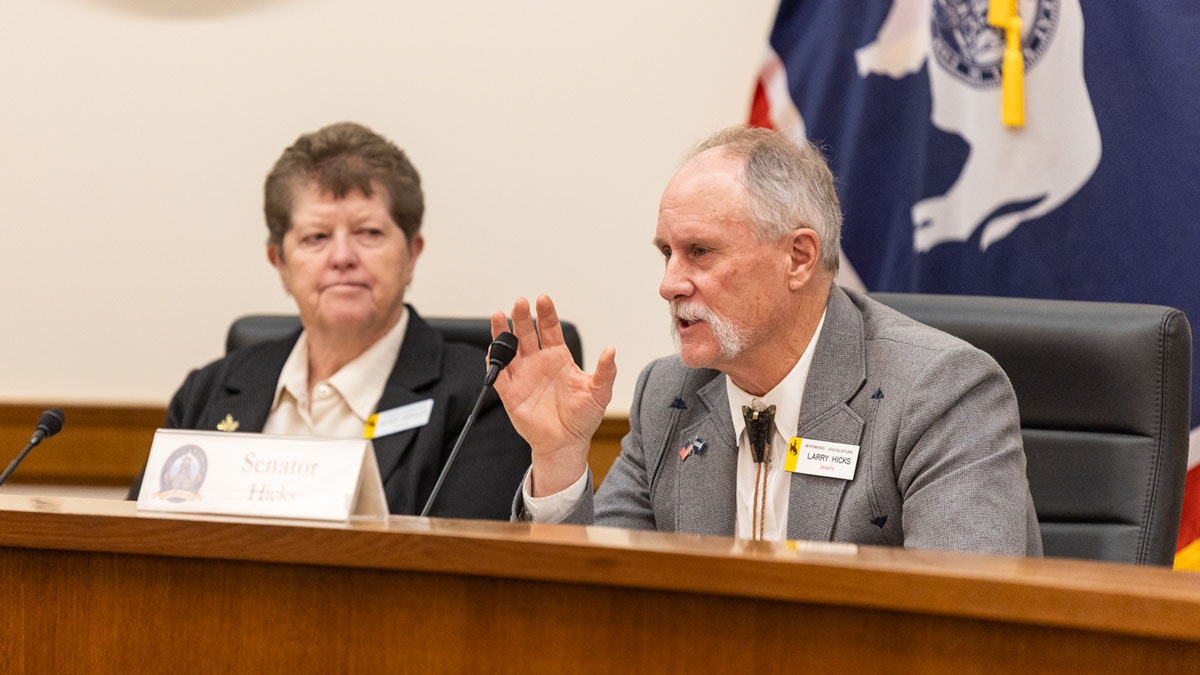The Wyoming Freedom Caucus is opposing procedural changes it says could more easily override the power of the state Legislature’s majority floor leaders.
The presiding officer of each chamber determines when and what bills are introduced to standing committees, while it is the majority floor leader who decides when and what bills will be debated by the entire body in the Committee of the Whole.
The proposed changes would allow the rules to be suspended with a majority vote.
Outgoing State Sen. R.J. Kost, R-Powell, said the proposal simply clarifies a procedure that was already happening.
Suspicions
The powers of the majority floor leader are established by the Manual of Legislative Procedures, while the powers of the Senate president and speaker of the House are established in state statute.
The majority floor leader-elect in the House, Rep. Chip Neiman, R-Hulett, has been an active member in the Freedom Caucus and is considered one of the most conservative members of the Legislature.
The Freedom Caucus says the duties of the House majority floor leader exist by virtue of the manual. If legislative procedures are suspended, the majority floor leader can be challenged on any particular bill and overridden.
“These proposed changes are especially concerning considering the fact that Representative Neiman was elected House Floor Leader,” says a Wednesday press release from the Freedom Caucus.
Attempt At An End Run
State Rep. John Bear, R-Gillette, chairman of the Freedom Caucus, said the rules are in place to protect minority coalitions from being overrun by the majority.
“These proposed changes would serve to concentrate power in the Speaker of the House, deviating from years of legislative tradition,” the Freedom Caucus says in its statement.
Any assertion that the changes directly target Neiman is disputed by the fact that the Republican caucus leadership election where he was elected was held nearly two months after the proposed changes were made in September.
There also are certain powers the majority floor leader holds, as outlined in the House rules, which carries a higher legal standing than the Manual of Procedures.
Moving The Goal Posts?
This year, the Management Council set up a subcommittee to update the rules, which is where the proposed change came from.
Co-chairman of the subcommittee was Rep. Albert Sommers, R-Pinedale, a more moderate Republican, who is speaker of the House-elect.
“This rule change is a power grab – and it’s not even disguised,” the Freedom Caucus press release says.
Sommers and Senate President Ogden Driskill, R-Devils Tower, did not respond to requests for comment on the issue.
Already Happening Anyway
Sen. Bill Landen, R-Casper, the other chairman on the subcommittee, said the proposed changes have been happening for the last 15 years and have nothing to do with who is majority floor leader now.
He sees the Manual of Legislative Procedures as more of a guideline than set-in-stone rules, and it hasn’t always been followed in the past.
“There’s nothing that’s being proposed in the manual that deviates from historic practice,” Landen said. “It’s been there all along.”
After consulting with the Legislative Services Office, Landen said his subcommittee was advised to make the changes to bring them in line with what the Legislature is already doing.
“Legal counsel said democracies do not favor supermajority votes,” Landen said.
Suspending The Rules
The proposed procedural changes specifically state they do not apply to the required ⅔ vote to rescind, change or suspend of the rules.
Bear said following the rule in itself could possibly be suspended with a simple majority vote under the proposed changes.
Kost disagrees.
“Not at all,” he said. “The ⅔ vote still applies.”
Not Unprecedented
Suspending legislative rules is a rare, but sometimes-used mechanism, for the Legislature.
One of the most notable examples happened last year when Bear voted to suspend the rules in an attempt to bring the Fairness In Women’s Sports Act to the House floor.
The bill, which Neiman supported, would have made it illegal for biological males to participate in female sports no matter their gender identity.
“It should have gone to a committee,” Bear said.
Bear’s attempt died on a 37-21 vote, but he said suspension requests have been successful in the past.
Not Ideal
While Bear would have theoretically come closer on his attempt if the rules had dictated only a majority vote for the suspension, he still opposes this change.
“It’s just a good practice,” he said. “The higher the regulation held means it has to be something serious to suspend the rules.”
Bear said there are usually no more than about three attempts to suspend the rules during a typical legislative session. He worries that by lowering the threshold it could be abused.
A National Issue
The topic of legislative rules also is a discussion in the U.S. Congress, where members of the hardline conservative House Freedom Caucus are demanding rule changes from U.S. Rep. Kevin McCarthy, R-California, in his bid for Speaker of the House.
There also were proposed changes made to the rules allowing changes to be made by a majority vote from the House and Senate, rather than the rules committees of the House and Senate.
Background
The Legislature is supposed to update its rules every four years, but it hasn’t happened for nearly two decades, Bear said.
He said that typically, rule change proposals like these would be put before the Rules Committee when the Legislature convenes, but Sommers and Driskill could let the proposal go straight to the chamber floors, where the change would only take a simple majority vote to be approved.
Landen said he doesn’t know what will happen.
“It could be handled differently in each chamber,” he said.
Although fighting the procedural change may seem like nitpicking to some, Bear said Wyoming residents should care about the issue because of the implications in abusing a more lax system.
“If they’re interested in who we elect for leadership, then they should be interested in the power of those positions,” Bear said.





